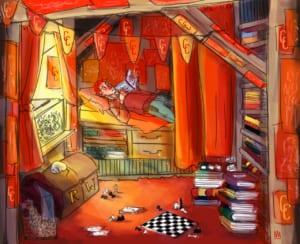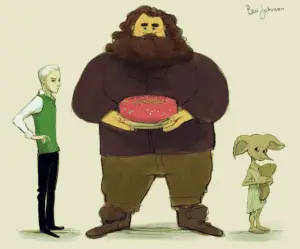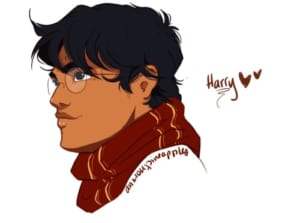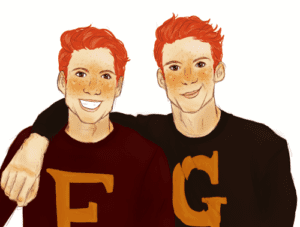Presented by “Harry Potter and the Reread Project”
We last left off at the Yule Bule, with Harry and Ron mistreating their dates. It wasn’t until I read on further that the Yule Ball roughly marks the middle of the fourth book and thus also roughly the middle of the series – which makes it the appropriate point in the series (both the Harry Potter and the reread series) to do a bit of a summary, in my opinion. So here it is: A summary of my changing opinions since I started rereading Harry Potter.
The Strengths
First, I have to admit that I didn’t quite remember how good the books actually are. JKR managed to create an incredibly tight tale: nothing that happens is ever useless or doesn’t somehow tie into the overall plot. Concepts or magical items that are relevant to the books’ events are often introduced well in advance and seem unimportant at first, like the Mirror of Erised or Portkeys.
She is also quite successful at writing descriptions that make it easy to imagine what she describes, whether that be the way a character looks, a place or an atmosphere. The Yule Ball and the Chamber of Secrets are the examples that stuck in my mind the most, probably because both scenes are very differently but strongly atmospheric.

Atmosphere in general is something that JKR does very well, in my opinion. The overall series deals with very dark topic but still manages to be light, funny and whimsical while also taking the characters and their personal struggles seriously. I think Chamber of Secrets is the best example of JKR’s ability to straddle the line between these contrasting moods in a book because it is simultaneously quite a scary book in which a threat in Hogwarts itself is attacking students and absolutely hilarious in its descriptions of the Mandrakes and Valentine’s Day.
Her main characters are also very strong: Harry, Ron and Hermione are all multifaceted characters who undergo significant character development over the course of the series. At the same time, they still realistically behave like the teenagers they are – they aren’t mini-adults or young characters that act like adults, they truly are children who age into teenagers.
The Weaknesses
Unfortunately, for the first two and a half to three books, it’s only the main characters that are actually developed characters with an inner life, while most other characters are more like archetypes: Dumbledore is the Wise Mentor™, Snape is the Mean Teacher™, Hagrid is the Friendly Supportive Teacher™ and Draco is the Terrible Bully™. Only in Prisoner of Azkaban do we get

new side characters who actually have an inner life and about whose motivations and past we readers learn, namely Sirius and Remus, and also learn about the inner lives of already existing characters like Snape.
Another problem of the series: It’s not exactly consistent in its morality. One example that seriously stuck with me was that Marge Dursley was definitely a bad person for making a comment about how Harry was useless because of his “bad blood”, but Hagrid making a similar comment about the Malfoys is fine. It’s a trend that as far as I remember only gets worse over the course of the series.
The first three books also shared some unfortunate similarities, like the fact that the plot was always based on the same scheme of there being a mystery that the Trio tries to investigate while being mislead until what as actually happened was revealed. It’s a plot structure that Goblet of Fire moves away from, luckily, and that the other books don’t move back to, as far as I remember.
Another flaw of the series is that for large parts of it, the adults are either incompetent or careless or outright evil so that the Trio can solve the mystery of the book. This is most obvious in Chamber of Secrets where the only real reaction by authority figures to students being attacked is firing Dumbledore who, quite frankly, hadn’t been doing much to protect his students either. It remains true in Goblet of Fire where Harry, a 14 year old student, has to compete in a tournament that far exceeds in his abilities with almost zero help from the supposedly responsible adults around him.

What’s also a problem is that in certain instances, JKR’s world building is just… well, holey. For example, it’s never explained what exactly that binding magical contract that a champion for the Triwizard Tournament enters even is and why Harry can’t get out of it, or what Wizarding children do before they turn eleven and go to Hogwarts. I also feel that Harry Potter doesn’t reflect the diversity of the world we actually live in, mostly due to its lack of openly LGBT characters whose relationships don’t destroy their lives, as well of its lack of characters of color in central roles rather than as seemingly token side characters. At the same time, JKR describes most characters without specifying their skin color or race, meaning that people have more than enough room to headcanon characters however they please. Of course, that’s still not as good as it could and should have been.
While those aren’t small problems, I think there’s an even bigger one that I couldn’t see the first dozen times when I read the series, mostly due to the fact that I was much younger than I am now: both Hogwarts and the Wizarding World itself are actually fairly messed up places. I already discussed this when I wrote about Prisoner of Azkaban where two innocent men almost have their souls sucked out without trial, but that is at least framed as being morally wrong and prevented by Harry and Hermione. The complete disregard that many wizards and witches have for Muggles, even if they don’t outright hate them, is another flaw of the Wizarding World in general, but considering this is again something that is quite explicitly condemned within the narrative itself.
The problems with Hogwarts itself are, as far as I remember, never discussed even though they are fairly obvious. Or rather, the problem with Hogwarts, singular, because ultimately everything that’s wrong in and with Hogwarts is tied to the fact that there seems to be absolutely no control exerted over the people teaching there. And unfortunately, I can name as many examples as books I have reread until now.
Hagrid, for instance, is given his teaching position despite never actually finishing school himself and continuously endangers his students by making them deal with, well, dangerous creatures. Trelawney’s teaching methods are questionable because none of the students seem to be actually learning anything, something that she justifies by claiming that no one can learn Divination anyway. Gilderoy Lockhart is absolutely incompetent and no one seems to care even though they are aware of the fact that he’s a complete and utter phony. But the most egregious example is probably Snape, who bullies and abuses some of his students, including telling a young girl who was hit by a hex that made her already larger than average teeth grow uncontrollably that he sees no difference in her appearance, and clearly favors others.
It’s a very serious flaw within a school environment if no one keeps an eye on what the teachers actually do because it allows of really messed up things to happen, as the Harry Potter series nicely illustrates. It’s also a flaw that has made my desire to actually go to and study at Hogwarts shrink quite a bit.
The Characters
This shrinking desire is definitely linked to the fact that rereading the series rekindled my dislike for Severus Snape. Although Barbara’s excellent piece about Snape recently convinced me to stop thinking of him as an absolutely despicable person who deserves to rot, I still think that he is far from being a good person, mostly because of the continuous abuse he inflicted onto his students. I can’t find it in me to not think that it makes him an asshole: he is in a definite position of power over them and no matter what kind of issues he has, his students are not responsible for them in any way. It is not fair or right that he takes his bitterness out on them and, ultimately, the fact that he does it is on him alone.
I also think that it’s quite understandable that many fans of the series hate Snape as much as they do, despite his heroic sacrifices as a spy for the Order. From Sorcerer’s Stone to Goblet of Fire, he has primarily appeared as a terrible and abusive teacher, something that many readers probably do have experience with in some form (though hopefully not to the same degree of terribleness as Snape). He is built up as a villain that readers are supposed to hate for most of the novels and after essentially six and three quarter books of this, it is incredibly hard to step back from that and regard his actions without the dislike that the books themselves created.
On the other hand, rereading the series has rekindled my love for several of its characters, especially Hermione, Remus and Sirius. In the case of Hermione, I genuinely did not remember all the reasons I used to like and admire her as much as I did, but rereading the books reminded me of her stubborn sense of righteousness, something that I relate to.
At the same time, I didn’t remember how much Ron and Hermione used to bicker at each other, especially in and after Prisoner of

Azkaban. It’s not just that they disagree and argue, it’s that one of them makes a swipe at each other every other interaction or is described as rolling their eyes at something that the other says, or something similar. As much as I doubt that this provide a good basis for a healthy romantic relationship, I’m not going to get into Romione discourse here, mostly because there are still three and a half more books to reread which means that there is also still quite a bit of development bound to be happening before these two actually get together.
My love for the Weasley family has also diminished quite a bit during this reread, though I can’t really say why. I think part of it is that I realized that as refreshing as Fred and George’s antics are, the twins are often kind of arseholes who have little regard for the people around them. The treatment of Percy by his family is also something that leaves a bitter taste in my mouth: his brothers do nothing but make fun of him for being ambitious and studious and his parents don’t seem to care. However, that doesn’t change that I think that the Weasleys are a great portrayal of a family who bickers and fights and doesn’t get along all the time but in which people genuinely love each other.
So far, rereading the books has at the same time reminded me of why I love them and alerted me to flaws that I couldn’t see when I read them in the past. These flaws aren’t meaningless or unimportant; they could actually break the series. I think the main reason they don’t is that JKR managed to create strong, relatable characters as well as a tight, well paced plot and diversely atmospheric settings that draw readers in so strongly that the flaws of the series aren’t immediately obvious. I genuinely believe that my love for Harry Potter won’t be diminished once this reread concludes.

